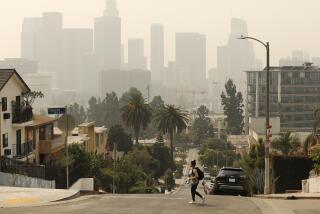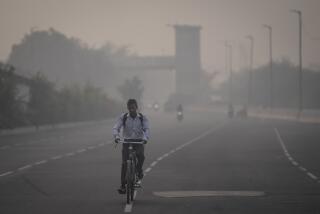Study links heavy pollution in China to lower life expectancy
BEIJING – Life expectancy is 5.5 years lower in northern China than in the south because of heavy air pollution, a study examining 20 years of data concludes.
The research -- published Monday in the Proceedings of the National Academy of Sciences by four economists in China, the United States and Israel – examined air quality readings collected in 90 Chinese cities from 1981 to 2000, and compared them with mortality data collected from 145 locations from 1991 to 2000.
Other studies have established strong correlations between air pollution and poor health and attempted to quantify the resulting loss of life in China. But the specificity of the study published Monday may provide a jolt to policymakers and the public as debate intensifies over how much China has sacrificed to achieve rapid economic growth.
The researchers found that a seemingly arbitrary Mao-era economic policy on coal-fired boilers for winter heating created dramatic differences in air quality within China. North of the Huai River, the government provided free coal, while people to the south were essentially denied central heat.
This policy essentially created two groups that could be compared with each other, allowing the impact of burning coal on air quality – and on health – to be isolated and quantified.
“We will never, thank goodness, have a randomized controlled trial where we expose some people to more pollution and other people to less pollution over the course of their lifetimes,” said MIT’s Michael Greenstone, one of the authors. “It’s not that the Chinese government set out to cause [a negative effect on health]. This was the unintended consequence” of the policy at the time.
Greenstone and his coauthors found that north of the river, total suspended particulates, or TSPs, were over 500 micrograms per cubic meter, or 55% higher than levels in the south. Life expectancy in the north was 5.5 years lower – almost entirely because of higher incidences of cardiorespiratory deaths.
Based on their modeling, the researchers estimated that the 500 million residents of northern China in the 1990s collectively lost 2.5 billion years from their lives.
“It’s a huge loss. Air pollution in China is really damaging people’s health much more seriously than the findings in previous literature” would suggest, said Yuyu Chen of Peking University in Beijing, another author. “After this study, there should be no argument over whether we should take the air pollution issue seriously.... We need a comprehensive clean air act in China.”
In January, thanks to a combination of windless weather, rising temperatures and emissions from coal heating, Beijing experienced a prolonged spell of some of the worst air pollution on record, widely dubbed the “Airpocalypse.” From the capital to Guiyang, 1,100 miles to the southwest, pollution closed highways, forced the cancellation of flights and outdoor activities, and sent countless people to hospitals.
Another spell of terrible air besieged the capital in late June. The episodes have raised debate about whether China is sacrificing too much of its citizens’ health for economic growth. In recent years, environmental degradation has sparked numerous protests across the nation, and Communist Party officials are well aware that the issue could spark a political crisis.
During the Airpoclapyse, China’s government experimented with various emergency measures, curtailing the use of official cars and ordering factories and construction sites to close.
In June, China’s State Council, or Cabinet, announced a package of 10 anti-pollution measures, including forcing heavy industries such as steel manufacturing to replace outdated technologies and publish data on pollutants.
But heavy polluters are being asked only to reduce their emissions for each unit of economic output by 30% by the end of 2017; critics say if economic growth continues to exceed 7% annually, total decreases in pollution will be small.
ALSO:
Egypt’s Muslim Brotherhood calls for national uprising
Ex-China railways minister given death sentence in corruption case
Brazil demanding answers from U.S. in wake of Edward Snowden leaks
More to Read
Sign up for Essential California
The most important California stories and recommendations in your inbox every morning.
You may occasionally receive promotional content from the Los Angeles Times.











